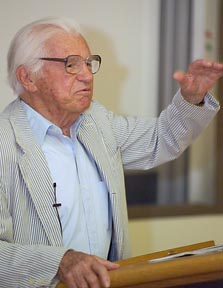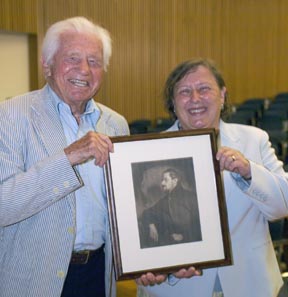How Cornell got its Joyce collection: Abrams relates an 'unlikely' story

James Joyce was a "bizarre, often infuriating, but irresistibly engaging genius" who today is one of the most highly regarded 20th-century writers in English, Professor M.H. "Mike" Abrams told a gathering of alumni and friends who attended his June 9 lecture opening the Cornell University Library exhibition "From Dublin to Ithaca: Cornell's James Joyce Collection."
Abrams, speaking in a crowded Hollis E. Cornell Auditorium in Goldwin Smith Hall on a hot, sunny afternoon during Reunion Weekend, recounted the improbable series of events that led to Cornell's acquisition in 1956 of a collection of the author's letters and papers that, as Abrams put it, "has no equal." The online version of the exhibition is at http://rmc.library.cornell.edu/joyce/introduction/.
The major Cornell players in the acquisition were Mario Einaudi, then a professor of government at Cornell; Stephen McCarthy, the university librarian; and President Deane W. Malott. Einaudi was contacted by a European friend who was representing the widow of Joyce's brother, Stanislaus, who had been keeping a large number of the writer's papers and letters and was anxious to sell them for $30,000, Abrams related. This was at a time when Joyce's writing was still considered controversial and his literary greatness had not yet been firmly established.
Einaudi took his friend's letter, which included a listing of the documents offered for sale, to McCarthy, who felt it was the "chance of a lifetime" to acquire the collection. Malott unhesitatingly agreed to the sale and set himself the task of raising the money.
Abrams digressed in his talk to describe William Gerhard Mennen, Class of 1908, the university benefactor whom Malott approached for the $30,000. Mennen had inherited a family company that made baby powder. He transformed it into a pioneering developer of men's toiletries. With his fortune made, he began to collect rare books and later donated many valuable volumes to Cornell Library, including rare Shakespeare folios, which he had personally, and without announcement, delivered to the library wrapped in a parcel.

While $30,000 seems an almost trifling sum today, Abrams reminded the audience that in 1956 it was a more substantial amount of spending power -- equal to about $210,000 in today's dollars, according to professor emeritus of economics Fred Kahn, he said. And the acquisition of the Joyce papers was a bold investment decision in the 1950s, when works by 20th century authors were not sought by collectors. Today, with Joyce's tortured brilliance exalted, the Joyce collection is worth many millions of dollars.
Following the lecture, Sarah Thomas, the Carl A. Kroch University Librarian, presented Abrams, who is the Class of 1916 Professor Emeritus in English, with a framed picture of Joyce in appreciation for his many contributions to the University Library. He has chaired membership drives and established an endowment that resulted in the acquisition of a unique set of volumes of William Wordsworth's "Poetical Works" (1827), with copious emendations by the poet.
Abrams' influential book of literary criticism, "The Mirror and the Lamp: Romantic Theory and the Critical Tradition," published in 1953, is included at No. 25 in the Modern Library's list of the 100 best nonfiction books written in English during the past 100 years.
Abrams' literary legacy is impressive. In 1962 he conceived and edited "The Norton Anthology of English Literature," now in its seventh edition. He has written six books, including "Natural Supernaturalism: Tradition and Revolution in Romantic Literature," which won the James Russell Lowell Prize in 1972, and he has edited six others. His numerous honors include the Award in Humanistic Studies from the American Academy of Arts and Sciences (1984), the Distinguished Scholar Award by the Keats-Shelley Society (1987) and the Award for Literature by the American Academy and Institute of Arts and Letters (1990).
Media Contact
Get Cornell news delivered right to your inbox.
Subscribe